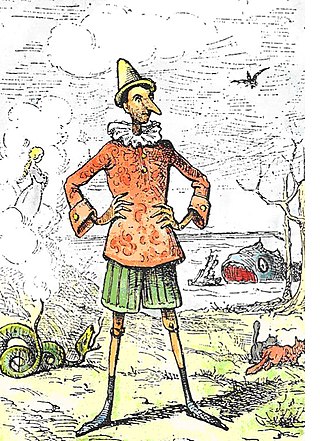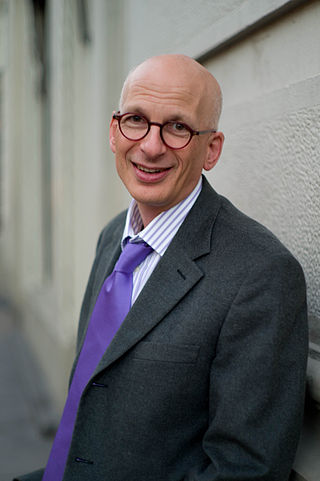
The Epimenides paradox reveals a problem with self-reference in logic. It is named after the Cretan philosopher Epimenides of Knossos who is credited with the original statement. A typical description of the problem is given in the book Gödel, Escher, Bach, by Douglas Hofstadter:
Epimenides was a Cretan who made the immortal statement: "All Cretans are liars."

A first-person narrative is a mode of storytelling in which a storyteller recounts events from that storyteller's own personal point of view, using first-person grammar such as "I", "me", "my", and "myself". It must be narrated by a first-person character, such as a protagonist, re-teller, witness, or peripheral character. Alternatively, in a visual storytelling medium, the first-person perspective is a graphical perspective rendered through a character's visual field, so the camera is "seeing" out of a character's eyes.
Permission marketing is a type of advertising in which the people who are supposed to see the ads can choose whether or not to get them. This marketing type is becoming increasingly popular in digital marketing. Seth Godin first introduced the concept in his book “Permission Marketing: Turning Strangers Into Friends, And Friends Into Customers.”

A lie is an assertion that is believed to be false, typically used with the purpose of deceiving or misleading someone. The practice of communicating lies is called lying. A person who communicates a lie may be termed a liar. Lies can be interpreted as deliberately false statements or misleading statements, though not all statements that are literally false are considered lies – metaphors, hyperboles, and other figurative rhetoric are not intended to mislead, while lies are explicitly meant for literal interpretation by their audience. Lies may also serve a variety of instrumental, interpersonal, or psychological functions for the individuals who use them.
Knights and Knaves is a type of logic puzzle where some characters can only answer questions truthfully, and others only falsely. The name was coined by Raymond Smullyan in his 1978 work What Is the Name of This Book?

Seth W. Godin, also known as "F. X. Nine", is an American author and a former dot-com business executive.

An exemplum is a moral anecdote, brief or extended, real or fictitious, used to illustrate a point. The word is also used to express an action performed by another and used as an example or model.
Pathological lying, also known as pseudologia fantastica, is a chronic behavior characterized by the habitual or compulsive tendency to lie. It involves a pervasive pattern of intentionally making false statements with the aim to deceive others, sometimes for no clear or apparent reason, and even if the truth is beneficial to the liar. People who engage in pathological lying often claim to be unaware of the motivations for their lies.

What Is the What: The Autobiography of Valentino Achak Deng is a 2006 novel written by Dave Eggers. It is based on the life of Valentino Achak Deng, a Sudanese child refugee who immigrated to the United States under the Lost Boys of Sudan program. It was a finalist for the National Book Award.
The Hardest Logic Puzzle Ever is a logic puzzle so called by American philosopher and logician George Boolos and published in The Harvard Review of Philosophy in 1996. Boolos' article includes multiple ways of solving the problem. A translation in Italian was published earlier in the newspaper La Repubblica, under the title L'indovinello più difficile del mondo.

John Jantsch is an author, speaker, and marketing consultant who specializes in assisting small businesses.
World's Biggest Liar is an annual competition for telling lies, held in Cumbria, England. Competitors from around the world have five minutes to tell the biggest and most convincing lie they can. Competition rules bar the use of props or scripts. Politicians and lawyers are not allowed to enter the competition, because "they are judged to be too skilled at telling porkies".

The Dip: A Little Book That Teaches You When to Quit (2007) is the tenth published book by former dot com executive Seth Godin. It is a 76 page book that illustrates the concept of "the dip"—a temporary setback that can be overcome with persistence—and how to recognize if you are within one worth pushing through or one where you should quit.

I'm Feeling Lucky: The Confessions of Google Employee Number 59 is a 2011 book by Douglas Edwards, who was Google's first director of marketing and brand management. The book tells his story of what it was to be on the inside during the rise of one of the most powerful internet companies from its start-up beginnings.

The Big Moo: Stop Trying to be Perfect and Start Being Remarkable (2005) is a collection of short essays on marketing. The essays were written by 32 different well-known authors in the field. They included Tom Peters, Malcolm Gladwell, Guy Kawasaki, Mark Cuban, and Daniel H. Pink. The specific author of each essay, however, was not identified. The book's editor, Seth Godin said that to identify which author wrote what essay would have been a distraction. The goal of the book was to spark people's imaginations as well as raise money for charity. Proceeds from the book are donated to the Acumen Fund, the Juvenile Diabetes Research Foundation International, and Room to Read.
Personal narrative (PN) is a prose narrative relating personal experience usually told in first person; its content is nontraditional. "Personal" refers to a story from one's life or experiences. "Nontraditional" refers to literature that does not fit the typical criteria of a narrative.

Ken McArthur, is an American author, entrepreneur, marketer, event producer, speaker and business consultant.
Tellability is quality for which a story is told and examined as remarkable with its constructed merit. Ochs and Capps examine tellability as the reason a narrative is told. Namely speakers can transform any instance into a meaningful narrative, but most are tellable due to how they deviate from everyday happenings and the prototypical. A narrative changes dependent on its level of tellability, and these elements are largely contextual. The tellability of a story often parallels the perceived truth of the story.
Truth-default theory (TDT) is a communication theory which predicts and explains the use of veracity and deception detection in humans. It was developed upon the discovery of the veracity effect - whereby the proportion of truths versus lies presented in a judgement study on deception will drive accuracy rates. This theory gets its name from its central idea which is the truth-default state. This idea suggests that people presume others to be honest because they either don't think of deception as a possibility during communicating or because there is insufficient evidence that they are being deceived. Emotions, arousal, strategic self-presentation, and cognitive effort are nonverbal behaviors that one might find in deception detection. Ultimately this theory predicts that speakers and listeners will default to use the truth to achieve their communicative goals. However, if the truth presents a problem, then deception will surface as a viable option for goal attainment.
Motivation impairment effect (MIE) is a hypothesised behavioral effect relating to the communication of deception. The MIE posits that people who are highly motivated to deceive are less successful in their goal when their speech and mannerisms are observed by the intended audience. This is because their nonverbal cues, such as adaptor gestures, sweating, kinesic behaviors, verbal disfluencies, etc., tend to be more pronounced due to increased stress, cognitive load, and heightened emotional state. There is some disagreement regarding the MIE hypothesis, with a few nonverbal communication scholars arguing that deception should not be examined as separate for senders and receivers, but rather as an integral part of the overall process.











